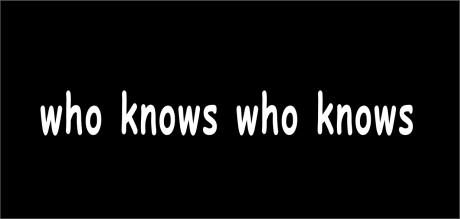Who knows
September 16th, 2009
Today’s *nix computer fortune:
What you don’t know can hurt you,
only you won’t know it.
Imagination is more important than knowledge. Knowledge is limited. Imagination encircles the world. — Albert Einstein (1879–1955)
Better don’t make this known. Just don’t!
[Quote provided by frequent reader and commenter BB — thanks a lot! Note that apparently there are at least two versions of Einstein’s quote, see Did you know? Of course not ;]
You need to apply some weight
in order to see how much nothing is.
Everyone knows that dragons don’t exist. But while this simplistic formulation may satisfy the layman, it does not suffice for the scientific mind. The School of Higher Neantical Nillity is in fact wholly unconcerned with what does exist. Indeed, the banality of existence has been so amply demonstrated, there is no need for us to discuss it any further here. The brilliant Cerebron, attacking the problem analytically, discovered three distinct kinds of dragon: the mythical, the chimerical, and the purely hypothetical. They were all, one might say, nonexistent, but each nonexisted in an entirely different way. And then there were the imaginary dragons, and the a-, anti- and minus-dragons (colloquially termed nots, noughts and oughtn’ts by the experts), the minuses being the most interesting on account of the well-known dracological paradox: when two minuses hypercontiguate (an operation in the algebra of dragons corresponding roughly to simple multiplication), the product is 0.6 dragon, a real nonplusser. Bitter controversy raged among the experts on the question of whether, as half of them claimed, this fractional beast began from the head down or, as the other half maintained, from the tail up.
— Stanislaw Lem: The Cyberiad. Harvest Book 2002 (original Polish edition 1967). Page 57, chapter “The Third Sally Or The Dragons Of Probability”.
Not ignorance, but ignorance of ignorance is the death of knowledge.
— Alfred North Whitehead
If only nonsense would not make so much sense.
Samuel Butler is often said to have said
Science, after all, is only an expression for our ignorance of our own ignorance.
which he might have never said. Anyway, I think that it might be hard to accurately cite this quote for anyone who actually read Samuel Butler’s note-books. But then, maybe he never wanted us to be that precise at all.
Knowledge (…) is based ultimately upon ignorance. To get knowledge out of ignorance seems almost as hopeless a task as to get something out of any number of nothings, but this in practice is what we have to do and the less fuss we make over it the better.
— Samuel Butler, Note-Books
At the workshop “Nichtwissen in der Wissensgesellschaft” (Ignorance in Information Society), when the discussions eventually boiled down to one of the workshops focal questions — how to deal with the unknown unknown — Ulrich Müller-Herold gave an illustrative example:
Imagine an aircraft manufacturer has just assembled a newly developed airplane that now is scheduled for its maiden test flight. To minimize all possible risks the airplane has gone through extensive ground testing, and a highly experienced test pilot is chosen.
Still, during the maiden flight unexpected circumstances might arise. So, we may ask what can be done in advance to be able to react as appropriately as possible. For instance, one of perhaps many measures, which the manufacturer may take, is to require the pilot to be completely sober.
What a wonderful example! First, it well illustrates the problem. What can mankind do to stay sober? Second, it even points out a solution. Like we should sharpen our whiskers. Third, and most importantly, it’s flawed.
When I said to Müller-Herold that I found his example very appropriate because it was flawed he told me a story of Heinrich Böll who once calmly replied to a critic that one could reach one’s goal limping, too. (“Herr Böll, der Vergleich hinkt.” — “Ach, man kann auch hinkend sein Ziel erreichen”, here quoted after Joachim Kaiser.)
But, if mankind was not limping probably there would have never been a goal. If an example is to illustrate a flaw it does so well if it is flawed itself. And, indeed, perfectly flawed it is.
